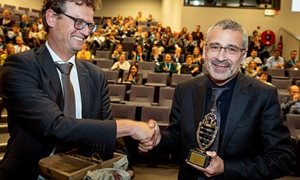23 November 2017

Chris Verhaak
 Together with the Amalia Children’s hospital and Stichting Kind en Ziekenhuis, Chris Verhaak (Medical Psychology, theme Mitochondrial diseases) received a grant of 450.000 euro from Zorginstituut Nederland for the project TRANSIT.
Together with the Amalia Children’s hospital and Stichting Kind en Ziekenhuis, Chris Verhaak (Medical Psychology, theme Mitochondrial diseases) received a grant of 450.000 euro from Zorginstituut Nederland for the project TRANSIT.
Chris Verhaak
| TRANSIT: Transmural care and interdisciplinary collaboration for children with chronic medical conditions and psychosocial comorbidity |
| One out of four children with a severe medical condition also shows vulnerability from a psychosocial perspective. They are limited in school attendance and have significant delays in reaching developmental milestones. In addition, they, as well as their family, have difficulties implementing disease management tasks into daily life, negatively impacting their health outcomes. The TRANSIT project aims to improve interdisciplinary care and collaboration between healthcare professionals in the Amalia Children’s Hospital as well as in primary care. In close collaboration with children and their parents, a digital environment will be developed, providing an interdisciplinary treatment plan and information about the psychosocial impact of the disease in daily life. In addition, the digital environment will support interdisciplinary and transmural communication and consultation. During the course of the project, health care use will be monitored as well as children’s participation in school and sick leave of the parents. The project closely fits with recent developments in child care in the Netherlands (Medical Child Care system), as well as Amalia plan to implementing organization of care from the perspective of the patient |
Related news items

Miniaturized microfluidic platform for automated epigenetic profiling
6 May 2021 Together with Fluidigm, a US-based company focusing on microfluidics, the team of Hendrik Marks publishes in Genome Research the development of a powerful plug and play ChIP-seq platform for minute amount of cells, such as embryonic specimens or small biopsies. go to page
Report of the 12th New Frontiers symposium Big data, better healthcare? - 1 November 2018
7 November 2018 Examples from the application of deep learning to image reading in pathology and radiology and the application of network medicine to monitor infectious disease outbreaks or collective mood states using twitter data showed the huge potential of big data approaches for building better healthcare. go to page
Report of the 12th New Frontiers symposium Better care, network care? - 2 November 2018
7 November 2018 No easy answers at this symposium last Friday, only challenges that can be overcome if we succeed in 5 things. First and most radically, put patients in the center of healthcare. Second, start with assessing what the local population needs and not what local professionals have to offer. go to page
Save the date for Radboud New Frontiers 2018: Betere zorg, netwerkzorg?
17 January 2018 After standard care, standardized care, and personalized care, network care will be care 4.0. But how exactly do you do that? Should we create new structures for it or is it just a matter of trust and ability to step back? go to page
Save the date for Radboud New Frontiers 2018: Big data, better healthcare?
17 January 2018 How is big data influencing healthcare and healthcare research? How will it help us and what are the limitations? The first day of the 12th edition of the Radboud New Frontiers symposium, on 1 November 2018, will give you all the answers (and raises new questions). go to page